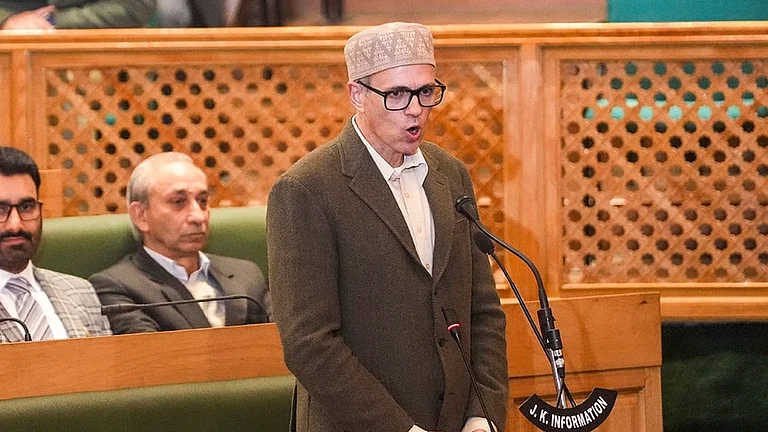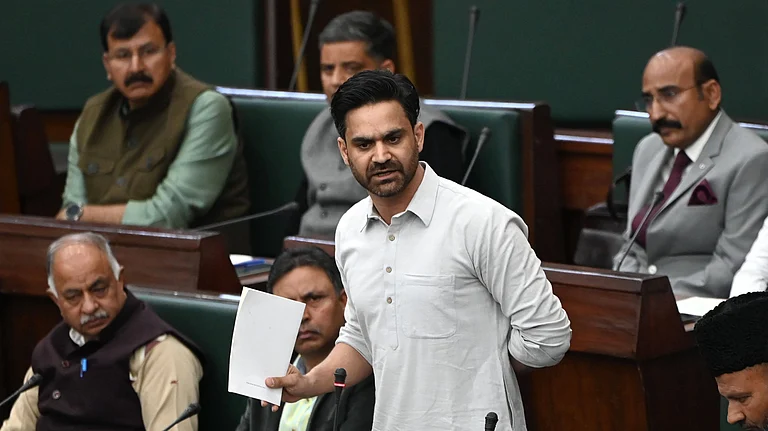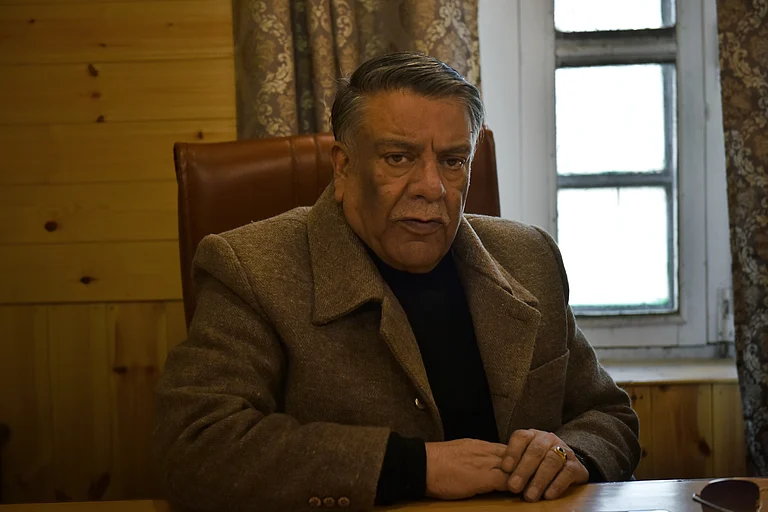On the party’s 25th foundation day on July 27, former Chief Minister Mehbooba Mufti addressed her workers in Srinagar, accusing Delhi of trying to dismantle her party but asserting that it has survived and is resurrecting.
In her address, Mehbooba Mufti adopted a characteristically belligerent tone, criticising the government for closing roads and calling for opening Jammu and Kashmir to Central Asia. “You closed the Srinagar-Muzaffarabad Road citing drugs, but the biggest drug hauls are being seized in Gujarat, and you didn’t close those routes,” she says. She also sought the release of Kashmiri prisoners, asking, “If you say the situation is normal, why are our people in jails without even being put on trial?”
Mufti accused the government of creating conditions that led people in North Kashmir to vote for the plebiscite. “This is what you’ve achieved,” she says. Mufti asked Union Home Minister Amit Shah to constitute a committee with representatives from both sides of Jammu and Kashmir and PoK to discuss the region’s issues “until the time you bring that part back.” After her speech, she elaborated further in an interview with Outlook.
Here are the excerpts:
The BJP is celebrating the fifth anniversary of the abrogation of Article 370, how do you evaluate the impact of the abrogation of Article 370 on Jammu & Kashmir and Ladakh?
Mehbooba: Well, even after the passing of five years Government of India celebration starts by putting most of the political leadership including the mainstream under house arrest, forcing shopkeepers to open their shops, and do all kinds of abnormal actions to create a facade of normalcy. What is there to say?
You have been a prominent opponent of the government's policies since the abrogation of Article 370. Many leaders left your party to form another, but now many are returning. How have your party and you navigated these changes, and how do you interpret this trend of leaders joining back your party?
Mehbooba: Having worked with me in government BJP knew that to implement their agenda they would need to get rid of the People's Democratic Party, which may be the biggest impediment in their way. So, to weaken me politically the process of breaking PDP was started much before August 5, 2019, when Jammu and Kashmir was dismembered, disempowered and robbed of everything that was sacrosanct to our people.
Many hybrid parties were created out of the rubble which people rejected in the recent parliament elections. Now majority of them want to re-join as they too can feel that PDP is the only viable alternative which survived the onslaught of GOI and its agencies. But we are being very selective about the re-entry.
The government and the BJP say there have been no stone-pelting incidents in Kashmir, Kashmir is safer, more peaceful, and happier now, with tourism and voter turnout at an all-time high. What is your take on such claims of the government and the BJP?
Mehbooba: The government may have succeeded in controlling the symptoms of what is ailing Jammu and Kashmir but the problem will remain there as long as it is not addressed in totality. We have witnessed how people in North Kashmir voted for someone who the government alleged to be involved in terror funding but also whose speeches demanding a plebiscite were appreciated by people. That should be an eye-opener for them as it tells you the inner story of Jammu and Kashmir and its people.
You have advocated for a joint mechanism involving leaders from both PoK and J&K. What would this mechanism look like, and do you think such ideas have any support in the current political landscape?
Mehbooba: Well, Jammu and Kashmir wedded itself to the idea of secular democratic India more than seven decades ago. Kashmiris too have an idea of Kashmir that they have been fighting for so many years and have sacrificed so much. So to maintain the sovereignty of our country we need to find ways and means to address this idea of Kashmir. That’s where Mufti Sahab’s (Mufti Mohammad Sayeed) road map of bringing the two Kashmirs together through travel trade, tourism, the joint council of representatives, and joint environmental and tourism initiatives. Jammu and Kashmir ultimately need a solution and this may be the best one where the sovereignty of our country does not get compromised and the aspirations of the people of all three regions are met.
How do you see Assembly elections? Also, after the parliamentary polls do you think PAGD has any future, or it is dead?
Mehbooba: With the kind of laws and recent amendments the Jammu and Kashmir Assembly has been reduced to a municipality where all powers are given to the LG. Elections are important to the extent that people may have access to their representatives who may be able to listen to their problems, which is missing in the present Babu system. As for PAGD is concerned it was something I had initiated to address a distressed situation where all felt hopeless. But once the participants lose trust and respect for each other there does not seem much left in it.
Are you disappointed by not winning the South Kashmir seat? What factors do you believe led to your loss?
Mehbooba: Of course, one feels disappointed after losing. There are many factors including the Government of India and all parties were on one side and I was fighting all alone from a party that had been broken into pieces with more than 40 of our senior leaders including ex-ministers, MLAs MLCs, MPs leaving PDP. Also, NC had put up a candidate who had tremendous religious followings where politics did not matter at all.
You have cited Engineer Rashid's win in North Kashmir as evidence of the failure of central policies and a plebiscite vote. Can you elaborate on this viewpoint?
Mehbooba: In north Kashmir, people gave a signal to Delhi about their aspirations and what they think about their allegation against Kashmiris of whom Engineer Rashid is one example. Another case is of our youth president Waheed Parra who was again charged in a terror funding case and spent two years in jail but still managed to get two lac votes. That speaks volumes about what Kashmiris think about GOI’s policies in Jammu and Kashmir.



























